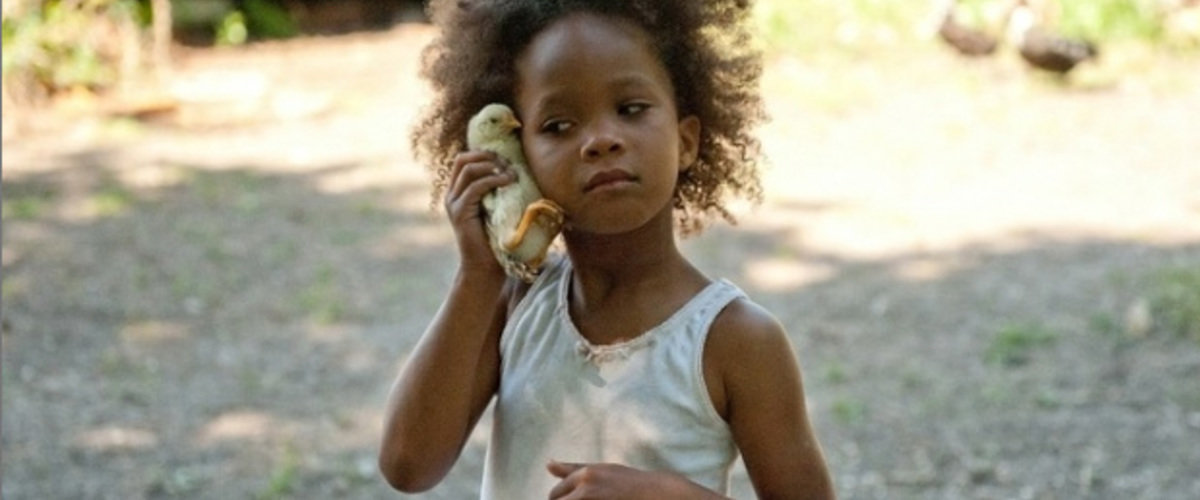Benh Zeitlin must have read Huckleberry Finn before he directed Beasts of the Southern Wild. The setups are almost identical: they feature a younger protagonist, in this case Hushpuppy (Quvenzhane Wallis). From the eyes of the protagonist we are introduced to the world and setting: for Beasts that is the Bathtub, the only bathtub in America where you get dirtier inside it. Its residents, including Hushpuppy’s father, Wink (Dwight Henry), choose to live there because they are free to live there as they desire, to live as an independent person. From the Twain-like setup, director Zeitlin crafts a triple winner: characters, setting, and fantasy. It is the best movie since the Social Network, and will probably be one of the best movies of the year.
The Bathtub is in a state of flux. There is a storm fast approaching, threatening to flood everyone’s homes. This is nothing new for Hushpuppy, who as a 6 year old, has had more trauma than a normal person experiences in their lifetimes. Her father takes a hard approach on parenting: he drinks a lot and disappears for days at a time. Her mother “swam away” at an earlier date, and in school she learned of aurochs: mythical beasts that feed on children that are rumored to be reappearing thanks to the melting ice caps. Learning what she can from the people in her life, Hushpuppy must grow up quickly if she really wants to live on her own.
Using the point of view of the child, Zeitlin makes it easy for us to understand the viewpoint of the Bathtub and its residents. Useful mechanical devices have different meanings here: levees are seen as the ruination of the beauty of the area, and hospitals are seen as prisons. By using the child, we can see the world through Hushpuppy’s eyes, but we also see that she is not a prophet; she learns a lot as the story goes on. The fantasy elements of the story are not integrated as well as they could have been, but they also provide some grounding to the fact that Hushpuppy is still a child.
One of the strongest elements in the movie is the setting. The Bathtub from afar can seem unlivable (as some well-meaning people try to tell the residents in the movie). With some of the images we see, it can be hard to disagree. When we get closer, the ingenuity of the residents shines. Schools, um, teach kids how to grow up as quickly as they need to, and what homes lack in lavishness they make up for in practical use: nothing is wasted in this environment. The special effects are fine for the small budget Beasts has. One exception is the shaky cam at the beginning; it does stabilize by the end, but it can be disorienting for a weaker audience member.
Quvenzhane Wallis is a force of nature. Much of the buzz around Beasts centers on her performance, and I could not agree more. Hushpuppy is such a complicated character: she displays feelings most 6 year olds have like abandonment, longing, fear, and helplessness, but outwardly she exudes pride, self-determination, and understanding. Wallis carries the movie by herself, sometimes strongest so when she doesn’t talk (she has a stare that would rival the scariest of individuals). Dwight Henry also has a tough task: his Wink must show why he parents Hushpuppy in such a tough, unforgiving manner. Fortunately, the script allows for plenty of explanations as to why his character teaches with such aggressive urgency. Over time, the audience’s opinion of him goes from disapproving to tragic and sympathetic.
Universal healthcare, welfare, and energy independence have no meaning in Beasts of the Southern Wild. The Bathtub is a timeless place where the only things that matter are pride, freedom, identity, and self-reliance, which are also themes of Mark Twain characters. The difference is if I wanted an adventure, I would hang out with Huck Finn; if I wanted to learn how to survive, I would learn from Hushpuppy.

